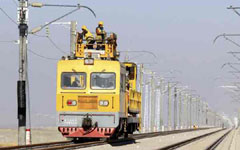Rail routes to fuel exports growth
By Zhong Nan in Urumqi (China Daily) Updated: 2014-05-28 07:09The opportunities involve transportation networks, housing and manufacturing facilities, as these countries strive to achieve their goals in infrastructure, urbanization and industrialization.
Peng said people living in Xinjiang and Central Asia have many similarities in diet, language, religion and traditions.
This advantage will help Xinjiang upgrade its logistics services and improve land telecommunications, as well as attract European, South Korean and Japanese companies that want to position their manufacturing facilities and sales networks closer to Central Asian markets.

|
|
 |
Wang Yongxuan, deputy director of Xinjiang's transport department, said that unlike other major Chinese cities that run their international freight cargo services independently, Xinjiang's international rail cargo services are working with China Railway Co and China Railway Container Transport Co to ensure quality service.
Xinjiang currently operates a routine rail freight service to Almaty in Kazakhstan. The service was launched in March and runs twice a week. It runs even three times a week when trade volume rises.
Xinjiang mainly loads construction materials, vehicle parts, industrial yarn, garments and construction machinery into containers en route to Almaty.
"The cargo train takes five days to make the 1,330-kilometer trip, but that's more than seven times as fast as maritime transport," Wang said.
"Xinjiang is planning another long-distance service to Hamburg in Germany via Kazakhstan, Russia, Belarus and Poland next year."
Luo Renjian, a researcher at the Institute of Transportation Research of the National Development and Reform Commission, said: "These moves will embody tangible efforts linking regional centers such as Moscow or Astana, and developing new growth hubs including Lodz in Poland and Almaty, and Novosibirsk in Siberia on the way to Europe."
He added that from a long-term perspective, the new rail routes will fully support trade, private investment, industrial productivity and the service industry in this massive regional market.
- Batman fan opens door to his Batmobile
- Top 10 most innovative companies
- Rail routes to fuel exports growth
- Consumers remain confident in first quarter
- High-end brands shift strategy from luxury to quality
- State Grid solicits social capital
- Shell and Yanchang Petroleum launch retail JV in Guangdong
- Xi stresses coordinated functions of market, gov't
















